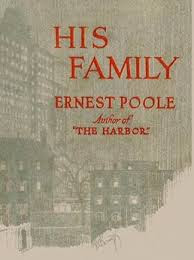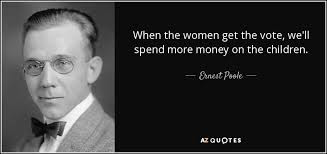His Family by Ernest Poole, 1917. Won the Pulitzer in 1918.

Ernest Poole (1880-1950) was born in Chicago, graduated from Princeton in 1902 and worked as a journalist as well as a writer of novels. He is reported to have
had a brush with socialism in the early 1900's and helped
Upton Sinclair do research for his socially conscious 1906 novel, The Jungle. As a writer, Poole worked for social
reform, including an end to child labor. He wrote The Harbour in 1915 which
dealt with labor unions in New York City.
In 1917 Poole wrote His Family and in 1918 it became the first novel to win the Pulitzer Prize. This work took on a theme of social reform in that much of the story
deals with the “tenement” families in New York and their struggles against
poverty, ignorance, disease, and unfair labor practices. The central character is Roger Gale, a 60
year-old widower who is trying to understand and help his three adult daughters. Roger is also trying to understand and adjust
to changes in American society, especially those brought on by World War
I. In this sense, Poole wrote on a theme
that was later picked up by Willa Cather in One of Ours and Edna Ferber
in So Big.

Poole is trying to go
beyond social reform even though his character, Roger Gale, begins with prejudice
and lack of sympathy toward the poor masses and ends up, at the end of his
life, accepting them as part of his larger family. Poole is also interested in one man’s efforts
to relate to his adult children, help them where possible, but also let them
have their own lives, and ultimately be willing to let go in order for the
children to shape their own lives. Roger regrets years of neglecting or, at least, not being very involved in his
children’s lives and then, later, wanting to see them happy. Once they became adults he found that what he
wanted for his children was not necessarily what they wanted for
themselves. He comes to question how
much he ever really knew them.
Finally, Roger has to face the conclusion that he has worried enough
about his family and has to try to find peace in his life rather than get what
he wants and thinks is best for his daughters. The beginning of WWI in Europe in
1914 brings on economic hardships to many in the U.S., much like the aftermath
of the destruction of the Twin Towers in New York on September 11, 2001. Roger feels it in his newspaper clipping
business and he is forced to lay off workers and take out a mortgage on his
home to keep the business going and to support his family.
Poole
seems to be saying that family is of great importance in our lives- or
that it can be if we choose that value. Circumstances require that Roger take in his daughter and her children and he has to find ways to
provide. This family commitment is set
against Roger’s youngest daughter’s choice to pursue wealth and pleasure
without concern for her marriage or her family. His other daughter, a public
school principal, goes the direction of adopting in an educational and social
sense thousands of poor families in the tenements. This daughter struggles with her social
commitments as opposed to her desire to marry and have her own children. It appears that Poole is laying out our life choices: pleasure, family commitment, or social conscience. In the end, his educator daughter finds a way
to have her own family and her large family of poor children in need of
education. His oldest daughter is
totally committed to her five children and his youngest daughter chooses to pursue wealth and pleasure without family concerns.
Roger ends his life being a happy man, at peace with how his family has turned out. His experiences
in later life have helped him appreciate his family and to accept them as they
are. He also develops an appreciation
for the family of man and the countless thousands who need help from
society. Poole succeeds in making a case
for social conscience and also tries to convey that this end does not have to
rule out our own family and concern for the children born to us. Seen in this light, I believe Poole had a
good message for his time and for our time, as well. In the 100 years that have passed since Poole
wrote His Family, the number of poor and needy families has not decreased. We still need to decide whether to be focused
only on our own family or to see humanity as our family and to provide help, as we
are able.








